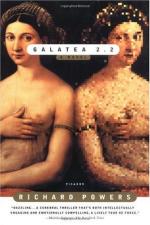|
This section contains 477 words (approx. 2 pages at 400 words per page) |

|
Galatea 2.2 Summary & Study Guide Description
Galatea 2.2 Summary & Study Guide includes comprehensive information and analysis to help you understand the book. This study guide contains the following sections:
This detailed literature summary also contains Topics for Discussion and a Free Quiz on Galatea 2.2 by Richard Powers.
Galatea 2.2 is a description of a writer, Richard, in his mid-thirties coming to grips with his failed long-term relationship, his father's disappointment in his choice of career and his increasing pessimism and distance from his passion of writing. Richard is given the opportunity to participate in an experiment with a cognitive neuroscientist to create a machine that can pass the masters level literature exam.
Details of Richard's now failed relationship with one of his former students are woven into the current experience of trying to create a machine that can learn. As Richard continues to work on the experiment, the reader is exposed to more aspects of their relationship. The author maintains a surreal distance from her by referring to her as C. In addition he never mentions cities that he lives in and refers to them only as first letters. The reader begins to wonder if in fact the anecdotes he shares are about real people and events or if it is his creative writing.
The reader is introduced into Richard's private musings about his literature. On the outside he defends his writing and his chosen career—perhaps replaying the argument with his father. However, on the inside, Richard experiences doubts about his ability to continue writing. He has become cynical and jaded by the world. He becomes gradually more aware that the characters of his stories have perhaps lived more life than he has. He even adopts a habit of hanging around the research center late at night because he has nothing better to do.
Richard's main non-romantic relationship in the story is with Philip Lentz, a cognitive neuroscientist. It is Lentz's idea to recruit Richard for the project of creating the machine. Lentz believes in the theory of connectivity—essentially that the arising of consciousness has to do with how information systems are connected and how they interact with outside stimulation. Lentz is generally irascible and difficult to deal with but ends up a kind of mentor for Richard, pushing him at just the right moments and helping him to discover the next steps that need to be taken to develop the project further.
Richard has two relationships that occur once he starts working at the center. The first is with Diana Hartrick, who works at the center and dissects hippocampi from monkeys as part of her research. He is invited over to dinner and brings candles as a romantic gesture, not realizing that she has two kids, including one with Down syndrome. The second is with A., the grad student that has been selected to compete against "Helen" the machine that Richard is helping to train. Richard realizes that A. is exactly the person he has been looking for his whole life and asks her to marry him even though he knows that she has a boyfriend.
Read more from the Study Guide
|
This section contains 477 words (approx. 2 pages at 400 words per page) |

|



